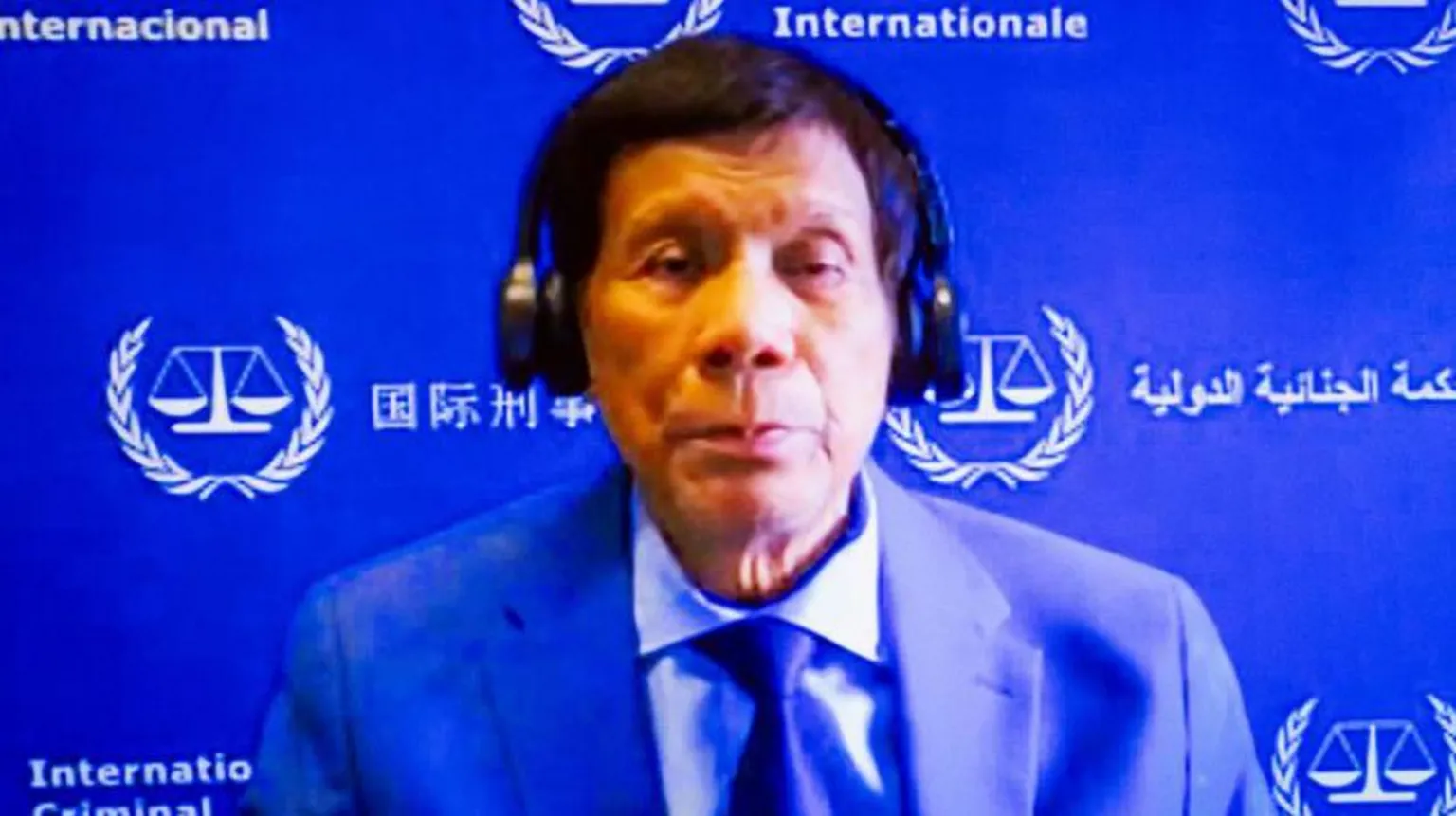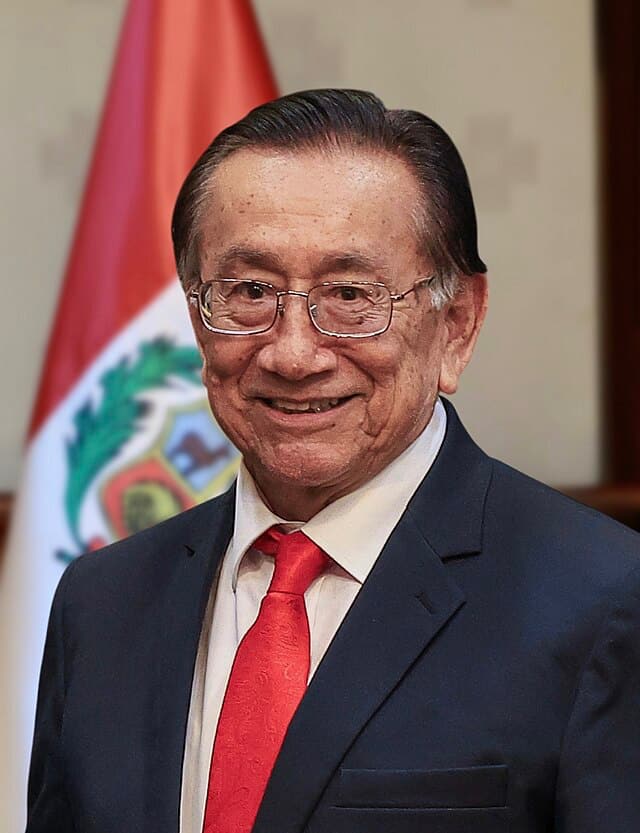Crying Havoc: Putin unleashes the dogs of war
Welcome this special issue of the Gordian Magazine. The enemy is not only within the walls of the United Naitons, but in most cases, the enemy constitutes an integral part of the organisation itself. This month, we take a closer look at the United Nations' part in the Ukrainian invasion. This issue contains many more exclusive reports, galleries and timelines by our literary editor, Alex Liberto, our puzzles creator, Katharina Wüstnienhaus, our interns, Atika Harba and Kaitlyn Rivera and other UN-aligneders, namely, The Young World Federalists, Usha Roopnarain and Ashkan. The editors are Adrian Liberto and Ariana Yekrangi.
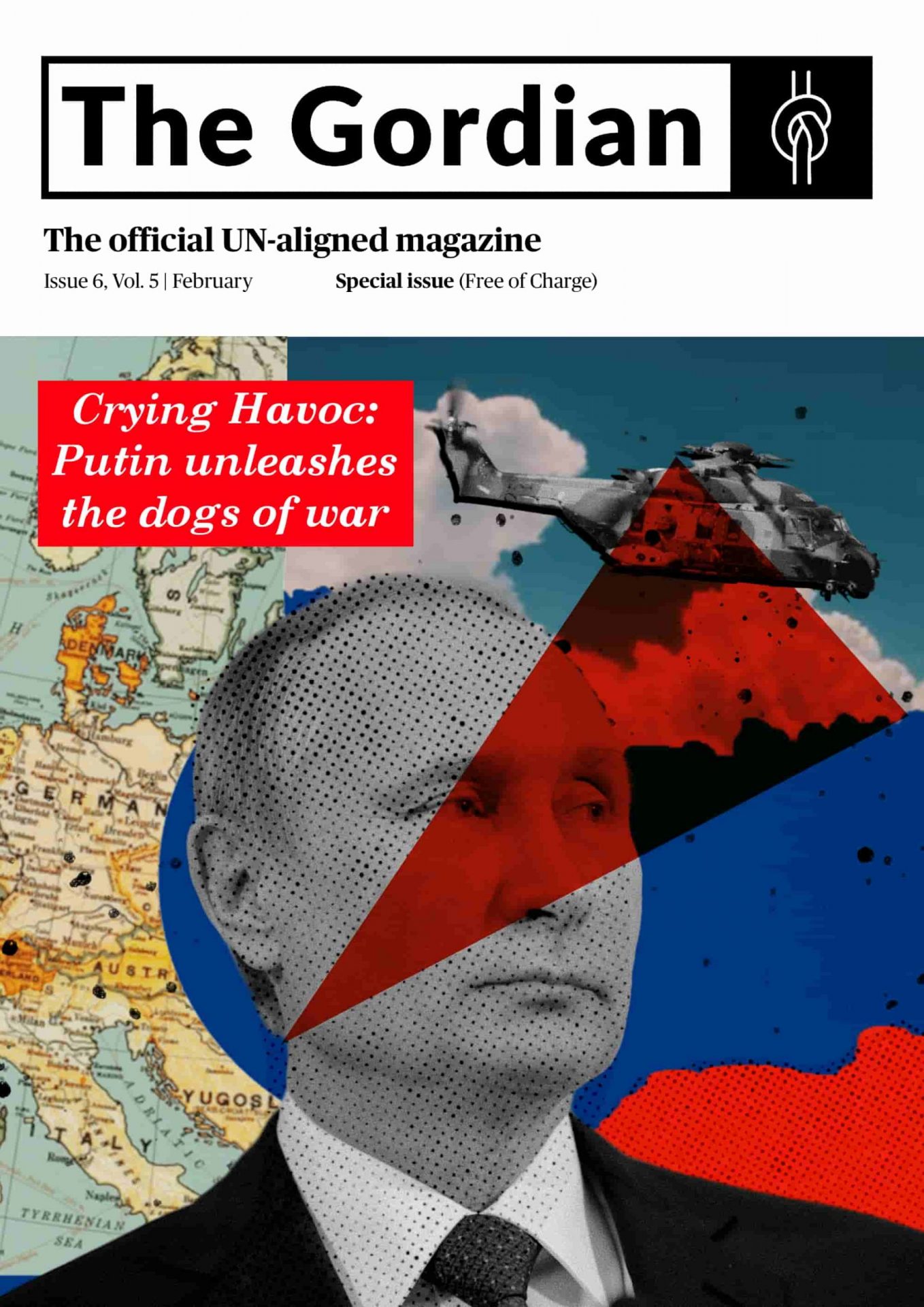
Letter from the Editors
Welcome to the March 2022 issue of The Gordian Magazine.
“War is an unacceptable way of resolving differences, or crimes committed by one country against another. It should not be glorified with epithets like ‘just’ or ‘holy’; nor should it be legitimised with conventions aiming at damage limitation.” Article 6 of UN-aligned’s manifesto is unequivocal when it says that “war must be a criminal offence”. Russia’s invasion of Ukraine is a blatant breach of international law and UN-aligned strongly condemns it. Countries can no longer be allowed to use the term ‘soldier’ or ‘patriot’ to justify the deployment of people to commit crimes.
This special issue of the Gordian begins with an update on UN-aligned’s open letter to the UN Human Rights Council demanding to take immediate action and bar countries who criminalise homosexuality from the Council.
Next, we introduce UN-alignders to a new opportunity to get involved with us; this time, by participating in writing a new book. After Unravelling the United Nations, Argead Style, this is the second book UN-aligned will be publishing with the help of its members.
In the featured article of the issue, Adrian Liberto writes about the Russian invasion from the United Nations’ point of view. He starts by asking if you would “entrust a child you love to the care of a school or nursery if you knew that not only many of its teachers, but the school board itself, consisted of child abusers, rapists and murderers?” If your response was: “of course not”, then maybe you should reconsider your trust in the United Nations. Adrian continues to explain why the latest developments in Ukraine is a death knell for the United Nations.
Next, Ariana Yekrangi writes about what it took for the European Union to unite against Putin’s aggression and what the block needs to keep in mind in a world of rising iron-man polarising advances of authoritarianism.
Moving on, we have prepared a photo gallery timeline consisting of more than 35 photos and 12 painful events in Ukraine’s history.
Next, Our members and readers express their thoughts and opinions about the latest events in Ukraine. We had called on our readers to send us their thoughts in a format of short commentary. If you would like to participate in future calls, please follow us on our social media, so you won’t miss the next announcement. Writers of this section include the Young World Federalists, Usha from South Africa, Ashkan from Iran and Alex, The Gordian’s own Literary editor. All of our authors condemn Putin for his actions in Ukraine.
Speaking of the Devil, in another piece titled “Vlady Hell: Putin Strikes Again!”, Adrian Liberto lists a range of crimes committed by Putin ranging from mass murder to mass deceit.
In the next piece, our current intern Kaitlyn Rivera, who is based in New York, presents a thorough timeline of all United Nations-Ukraine related events that led to the war.
Sticking with the theme of the issue, The Gordian’s literary editor Alex Liberto writes about Isaac Rosenberg’s Break of Day in the Trenches, one of his favourite war-time poems.
Next in our Diaries from Refugee Camps series, we read an interview conducted by Atika Harba with a Syrian refugee, Somaya. Diaries from Refugee Camps is a series that gives readers a glimpse into the challenging life of refugees. If you are a refugee and would like to contribute to this series, we would love to hear from you. Atika Harba was one of the UN-aligned interns.
In the second gallery of this issue, Ariana Yekrangi takes you all around the world with photos of protestors standing up to Putin’s bloodthirsty antics.
In the penultimate article of the magazine, we would like to introduce you to our new Puzzles editor, Katharina Wüstnienhaus. In her first quiz for Gordian Magazine, she created an engaging and information-rich quiz about Ukraine that you won’t want to miss.
And lastly, as the tradition goes, Adrian Liberto accumulates (pretty much) everything that happened in the last month. So make sure to catch up with what you may have missed in February 2022. This month, we will not be creating a podcast episode of this, as we would normally do, owing to events in Ukraine which have directly affected one of the presenters.
We hope you enjoy these stories and all other ones that we will be sharing with you.
If you are in a position to financially support the magazine, we would greatly appreciate your generosity. Every contribution, whether big or small, means we can keep investigating and exploring solutions to critical issues of our time; and it only takes a minute. Support the Gordian Magazine with a Patreon subscription.
Adrian Liberto and Ariana Yekrangi are the Editors of The Gordian Magazine.
Update on UN-aligned’s open letter to the United Nations Human Rights Council
By Ariana Yekrangi
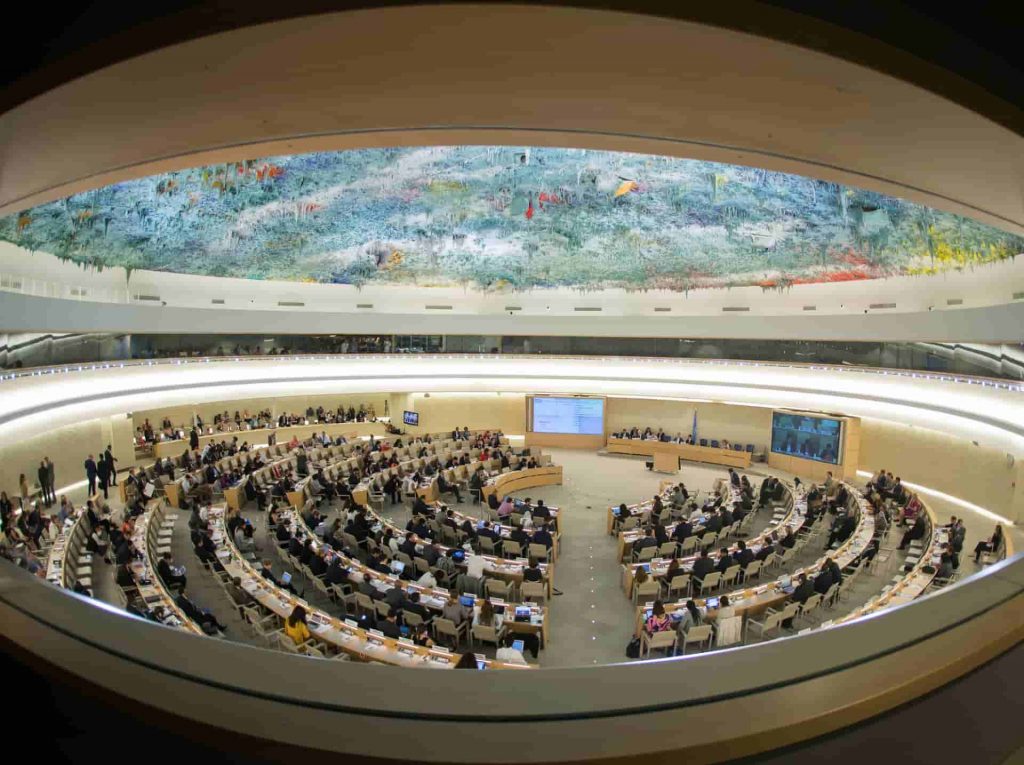
The chamber of Human Rights Council. Photo: United States Mission Geneva/Flickr
In the second half of 2021, we launched an Open Letter to the United Nations Human Rights Commission requesting that countries that criminalise LGBTQ+ rights be barred from forming part of the commission.
So far, the letter has been signed by over a dozen LGBT+ organisations from around the globe, as well as individual activists. We originally planned to send the letter on 22 February 2022. However, owing to the latest developments in the United Nations and the ongoing war in Ukraine, we have decided to postpone the open letter as otherwise it would be sounded out by these tragic events.
We are currently working on a new action plan for the campaign and will update you accordingly.
- If you have signed this campaign, thank you so very much.
- If, for any reason, you haven’t signed the campaign yet, please consider doing so. Whether you agree with all of UN-aligned’s principles or not, is not the issue here. This is not about us, but about the UN’s failure to take its mandate seriously by cosying up to governments that flout basic human rights.
In any case, be assured that UN-aligned will continue to champion the rights of the LGBTQ+ community all around the world. We truly believe that far from upholding human rights, the current policy at the United Nations Human Rights Council makes a mockery of them and it must change immediately.
If there is any other way you could help us make our letter more impactful, please let us know. We would really appreciate any help we can get in this regard.
What will your ideal world look like? Collaborate with us on a new book
By Adrian Liberto
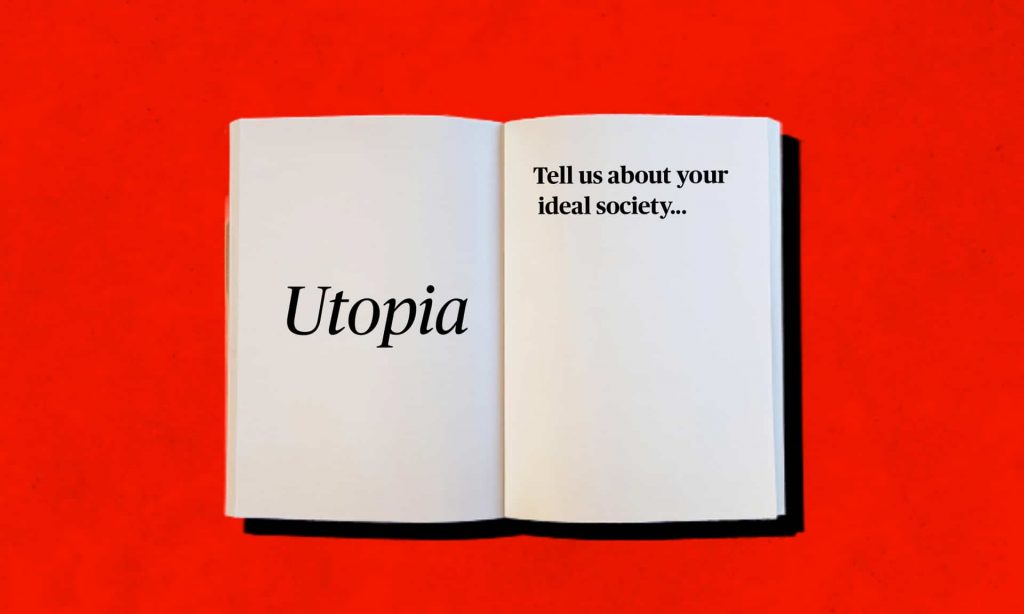
Photo by the UN-aligned design team.
Many “Utopias” have been written throughout the centuries such as Plato’s rather sinister Republic, Thomas More’s Utopia (1551) and Tommaso Campanella’s The City of the Sun (1602). In the 20th and 21st centuries, dystopias have become more in vogue, from Aldous Huxley’s Brave New World (1932) and George Orwell’s Nineteen Eighty-Four (1949) to Margaret Atwood’s The Handmaid’s Tale (1985).
An ideal society is like a magnificent temple, but temples cannot be built without vision, without plans, without resolve. So what would your ideal world look like? UN-aligned would like to tweak its vision for the future with the support of its members and it will be launching a monthly series within The Gordian, which it hopes to publish as an individual work in the future.
Your contribution can be a few paragraphs long or a few pages and you are welcome to discuss your ideas with one of our editors, Adrian or Ariana, first.
Be heard and help inspire a better world!
Putin’s invasion of Ukraine is a death knell for the United Nations
By Adrian Liberto
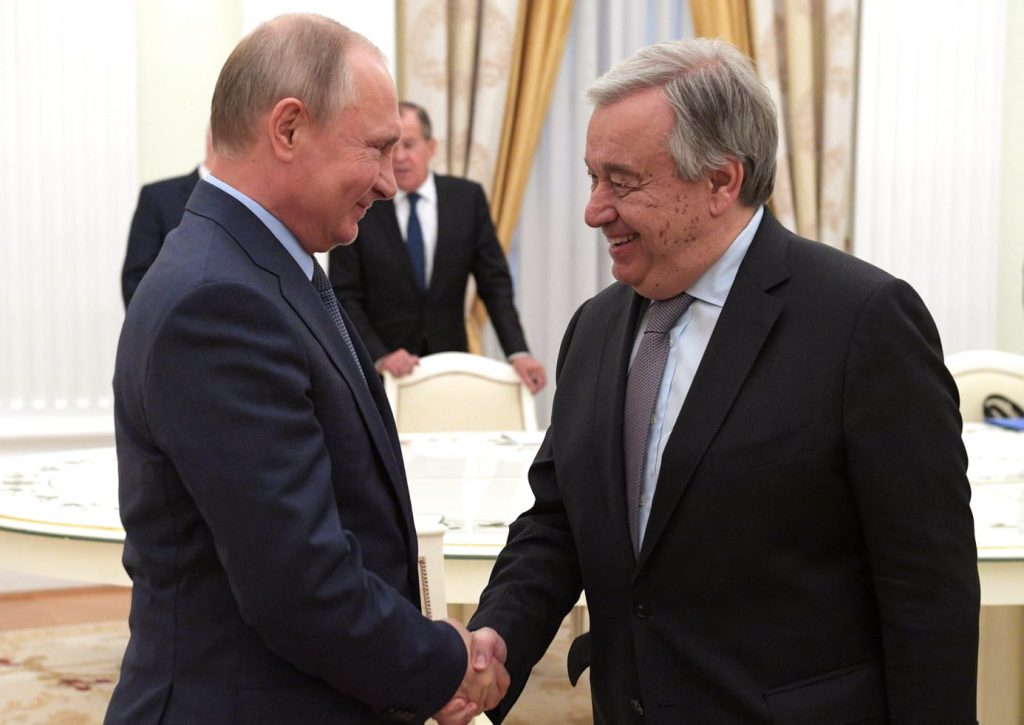
Vladimir Putin shaking hands with UN Secretary-General António Guterres. Photo: The Kremlin, Moscow
Would you entrust a child you love to the care of a school or nursery if you knew that not only many of its teachers, but the school board itself, consisted of child abusers, rapists and murderers?
Of course not! And yet that is exactly what we are doing when we entrust world peace and human rights to the United Nations. The enemy is not only within the walls of the United Nations, in most cases, the enemy constitutes an integral part of the organisation itself. By ‘integral’ I am particularly referring to the five permanent members (P5) of the UN Security Council. In fact, most of the world problems since WWII stem directly or indirectly from one or more of these five permanent members. The Russian Federation’s invasion of Ukraine is just one of the many instances of a crisis that has been caused or exacerbated by one of these powers. I have discussed the flaws of the UN at length in my recent book: Unravelling the United Nations, so I will not dwell on its lack of structural integrity or its monumental failures here. Instead, I wish to focus on the current crisis.
The situation leading up to and following the invasion of Ukraine by Putin will no doubt provide yet another case study of the UN’s ineffectual nature, but even though the tragedy is still unfolding, it has already added a new dimension to the mix of UN fiascos; perhaps its most terminal yet.
What makes this situation unique?
A combination of factors makes the UN’s position regarding this crisis even more blatantly absurd than previous ones. They are:
- The unprecedented clarity of the situation
- The parallels to Hitler
- The fact that both word and spirit of the UN Carter have been contemptuously and openly violated by one of the P5
- The UN’s powerlessness in the face of a full-scale, unprovoked assault on a peaceful sovereign state
- The threat of nuclear retaliation by this P5 member to any entity who tried to stop him in his unlawful aggression
Putin’s invasion of Ukraine transcends the plane that allows the UN its usual wishy-washy excuses of equivalency. The situation here is as clear cut as Sauron versus Frodo, or the Empire versus the rebels in Star Wars. Moreover, Putin’s anachronistic nostalgia of Soviet era imperialism adds a glaring contrast to the liberated democracies of 21st century Europe, Ukraine included.
Putin’s war is a one-sided, malicious and completely unjustified attack on a sovereign state and in some ways, it is even more brazen than Hitler’s initial moves against parts of Czechoslovakia and Poland. The inability of the League of Nations, the United Nations’ predecessor, in the face of Nazi Germany was one of the reasons for its demise. It could no longer justify its existence in the face of such failure. Now, despite the UN’s string of disasters, this might just prove to be the one that will be quite impossible to sweep under the carpet, leaving the organisation exposed to an uncertain future.
Not achieved
On February 25, the UN Security Council met to condemn Russia’s attack in a strongly worded US-drafted resolution. Of course, the Russian Federation vetoed the proposed resolution by voting against it. China, India and the United Arab Emirates abstained, with the remaining 11 members voting in favour. Visibly frustrated, UN Secretary General Antonio Guterres admitted defeat:
“The United Nations was born from war to end war: today that objective was not achieved.”
He was equally ruffled a few days earlier when at a press conference he was asked about the possibility of sending Peacekeepers to Ukraine; he was forced to reply that it could not happen because Russia would veto such a proposal.
Will kicking Russia out of the Security Council fix the United Nations?
As the name implies, the business of the Security Council is security; in other words, peace. How can we have peace if one of the principal guardians of it is one of the most actively bloodthirsty men alive? (See related article on Putin.) It is like trying to win a football match while one of your best players is only intent on scoring own-goals. Of course, it would not happen in a football match, even though it is only a game, because the player would soon be cast out. Peace, however, is not a game, and yet innocent people are dying because the UN is powerless to kick Russia and its supporters out of the team. If China attacked Taiwan, once again, the UN would have to wag its finger and watch helplessly. Even more tragic is the fact that, if Putin, who appears to have lost all sense of decency, decided to go for the nuclear option, the UN would be just as powerless to stop him.
High Treason
The presence of peacekeepers on Ukrainian soil would have certainly been a deterrent, pitting Putin against the world, while providing some protection, but the UN’s failure here is more than just logistics. It is a case of high treason. I am not referring to the Secretary General or the thousands of UN operatives, the majority of whom abhor this war of aggression. I am referring to the organisation itself embodied in its Charter. As an organisation, the United Nations is compromised as it has never been before and the reason for this is because it has put form before substance; its makeup before its principles.
The UN should represent the best of humanity. Its members should be committed to peace, human rights and environmental protection. Instead, it is a club whose members can regularly flout its tenets without impunity. Moreover, by default, every person on the planet is expected to endorse this club of nations because we are assumed to be a part of it. As the opening of the Charter claims:
“We the peoples of the United Nations determined to save succeeding generations from the scourge of war…”
Thankfully, members of UN-aligned have formally disassociated themselves from that club. We have our own “club”, one that is founded on inviolable principles, rather than a bureaucracy that is at the mercy of powerful states. “We the peoples” applies to each individual member in UN-aligned, irrespective of one’s country. It is our principles that bind us together, not a derelict bureaucracy. When it comes to decency, there is no compromise.
The king is dead. Long live… Er, sorry, we haven’t decided yet!
Former US president Trump was keen on undermining the UN. This vendetta did not spring (or wholly spring) from a just indignation at the organisation’s inherent weakness or from the fact that his boasting had drawn laughter from delegates during his 2018 address. Unlike his pal Putin, who is happy to plough ahead with his plans without giving the UN a second thought, Trump hates criticism, or being held accountable, even nominally, to anyone else.
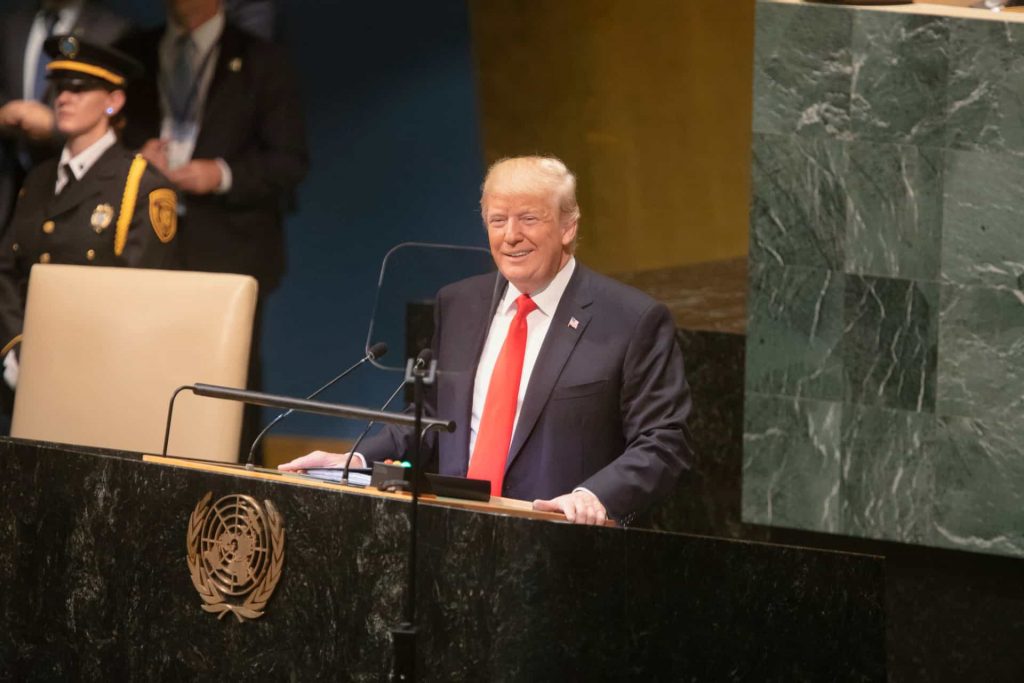
Trump addressing the 73rd session of the U.N. General Assembly on Tuesday, Sept. 25, 2018. Photo: White House/Flickr
He also detested the fact that American money was going to social and cultural causes. This highlights the fact that, world peace apart, the UN does accomplish a great deal when it comes to crying foul or supporting worthy causes. Its demise would leave a gaping hole in many areas of human development. That is why it is so important to lay the foundations of a new world order from now. UN-aligned has already done this and its vision for the future includes a federal order that enshrines choice and respect.
Reform is not an option. The 2005 Ezulwini Consensus, for instance, requesting a fairer African representation is still a pipe dream. The UN is in no mood to change and never has been. Here is another example taken from Unravelling the United Nations relating to the veto:
“Some countries, led by France, have tried to limit this power when the Council is deliberating on extremely serious situations, like those involving genocide. The cynical response, in September 2015, of the Russian Ambassador to the UN, Vitali Churkin, who had also blocked a resolution condemning the Srebrenica Massacre on its 20th anniversary a few months earlier, was unequivocal: “We see it as a somewhat populist proposal. If France wants to limit its own veto, they are welcome.””
The best way forward is to create something new and show the UN up for what it is. The organs that work well could continue to function under a different umbrella, while the Leviathan that is the United Nations with all its steadfast anachronisms and severe limits could be left to collapse under its own weight.
As American futurist Buckminster Fuller pointed out: “You never change things by fighting the existing reality. To change something, build a new model that makes the existing model obsolete.” Now is the time for action and you can start now by becoming a free member.
I would like to conclude with a message to Putin: You have failed. Despite the extraordinary level of your evil, it is no longer the focus. What stands out is the bravery of the Ukrainian people. You are making martyrs and heroes and whatever the military outcome, you have already lost. As the 30 brave soldiers said to the Russian ship before they were blown out of existence (though there is a possibility they may have been captured): “Go fuck yourself Russian ship!”, I say the same to you: “Go fuck yourself Putin!”
At last, European Unity Prevails
By Ariana Yekrangi
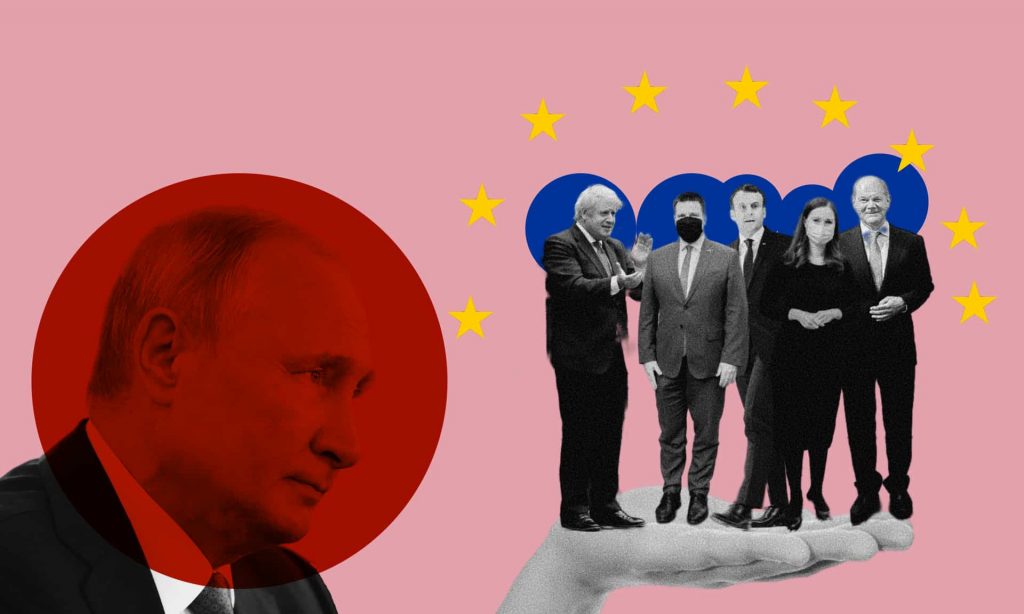
Photo by the UN-aligned design team.
We stood by and watched Putin help deliver both Brexit and Trump. We were quite happy letting him tear Syria apart. So what, he invaded Donbas? He is a cold-blooded murderer? “What then? poor beastie, thou maun live!”
“Putinism required diplomacy”, that’s what diplomats said anyway. It was obvious to most, at the time of each of these hammer blows, that Putin’s tentacles had penetrated through and influenced our democracy. Our response to this despot for his crimes? The occasional sanctions here are there. Don’t get me wrong; although they are increasingly becoming the bulwark of our international system, sanctions can work. But they won’t if we are too paralysed by indecision, or when we are at crossroads with ultra-complex choices: utilising green energy, on the one hand, or continuing importing Russian gas during a climate emergency, on the other.
Across the European continent, the differing assessments of Helsinki, Berlin, Paris and London as to how to construct something stable out of the rubble of post-Soviet Russia, have historically always been in flux. Different European leaders have taken different views at different places at different times. Finland took a neutral position towards Russia (Finlandisation), Tories happily welcomed Russian money into Londongrad and Victor Orban became besties with the man - psychologists are right, opposites attract is an utter rubbish theory.
The threat of Putin and his permanent place in the UN Security Council has been a tricky question from the start, although, until now, all of the man’s madness manifested itself in a few vetoes and an invasion here and there. The vengeful and blood-curdling image of this Russian dictator has been too gradual, even for China and the US. Dealing with Russia’s fascism required concerted action and, crucially, the solution had to involve the acknowledgement of hypocrisy - namely that countries that have already broken international law, can successfully persuade others not to follow their path.
On the 18th of February Putin amassed 190,000 troops to the Ukrainian border after Ukraine’s renewed talks regarding its NATO membership.
I have to say, when I first read that, I was almost relieved. So apocalyptic have my recent imaginations been: 190,000 troops - bad news for the Ukrainian’s children, I thought, but okay for their children’s children, who will be living in Putin’s imperial delirium and will most certainly not be reading any history, not this version of it anyway. Maybe that is what we are collectively on the point of settling for…
Putin became more and more unstable. His composed appearance gave way to his unhealthy obsession with the reunification of the motherland. Yes, Russia had waged war before, but never on Europe, at least not since World War II. Europe went on high alert mode: France’s Macron called to check up on him, the foreign ministers of EU countries met with Russia on numerous occasions. Clearly, Putin was enjoying himself: everyone had to bring solutions to a problem of his own making. Soon it became apparent that Putin is not an interlocutor. For Putin, international law and human rights has always been an a la carte menu and he has always been one of those pitiable petty autarchs who needs to have it his way. Everyone had fallen for a big strategic deception campaign.
On the 24th of February 2022, Russia launched a full unprovoked invasion of Ukraine and everyone realised that shit had hit the fan.
At first, countries like Germany and France were at odds with the Anglosphere over how to handle Russia. There were options on the table, turns out they always were, but which ones are the best for “my country”? Once Putin invades Ukraine, he could come for Finland, which is also not a NATO member, and then it will probably want to go for Sweden, again, also not a NATO member. What stops Putin from going for Estonia, Moldova, Lithuania or Latvia next? Where would it end? You might want to ask Hitler.
Uniting all of Europe in the face of armed aggression against Ukraine did not take long and so far the response to his aggression has been unprecedented. For the first time, Germany sent arms to Ukraine breaking a longstanding practice of blocking lethal weapons from being sent to conflict zones. Poland, Hungary and Czechia, notoriously famous for being fascists when it comes to accepting migrants, welcomed Ukrainians with open arms, even going as far as abolishing all paperwork for them when crossing the border, I suppose being white helps - the continent’s double standards sometimes really gets under my skin - even Viktor Orban said that “whatever sanctions EU member states agree on, we’ll back them”. What a day to be alive!
This was a moment of truth for Europe. For years, it has watched iron-man rising worldwide and polarising the advance of authoritarianism. It has closed its border to those in need and it has refused to rap their allies’ knuckles when they have their naughty episodes. You proved it, you can take action if you want to. It is time Europe opens up and acts as a force for good, rather than to isolate itself like a group of private club members, which many claim they are, that has no interest in anything else, but their own wealth and health.
Putin, putout!
Putin has taken a very large risk that this will go wrong. At this moment of maximum danger, he must implement an immediate ceasefire, but of course, he probably won’t. The moment they take bread and circuses away he will be exposed. Already there are plenty of people in the Russian elite who are questioning his judgement and, most importantly, his mental stability. With the economic cost steadily mounting, Putin’s Russia may soon feel it needs to make its move. There is only one way out of this morass and that is for Putin to be removed from office, a move that is for Russians to will and to desire, but when that moment nears let’s make sure to give him the same treatment as any other dictator.
The painful history of Ukraine — A photo timeline
By Ariana Yekrangi
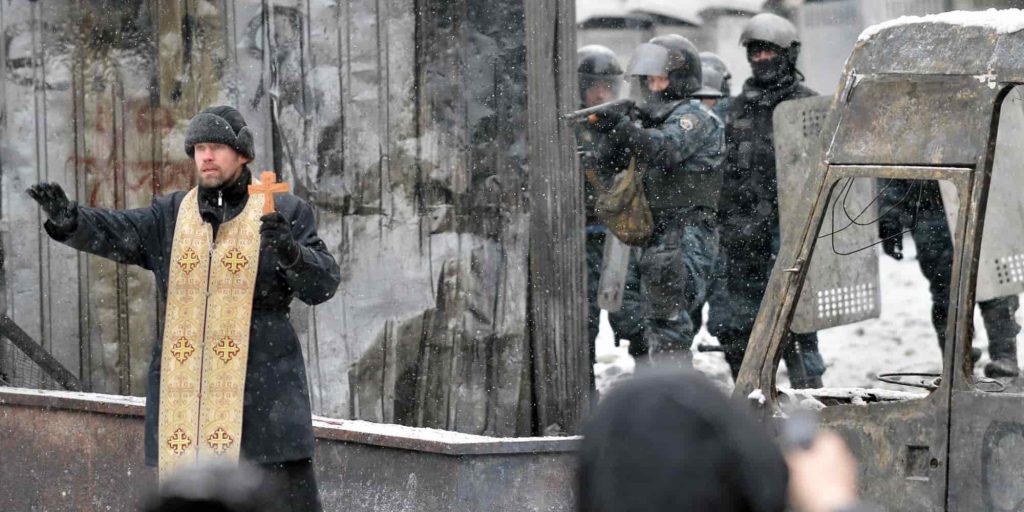
An Orthodox priest tries to stop clash protesters the police in the center of Kiev on January 22, 2014. Photo: AFP
Ukraine’s fate may be rooted in its heartbreaking past. In this photo timeline, which consists of more than 35 photos and 12 painful events, we’ll guide you through the county’s tragic history.
Comments from our readers about the Ukraine invasion
By Alex Liberto, YWF, Usha Roopnarain and Ashkan
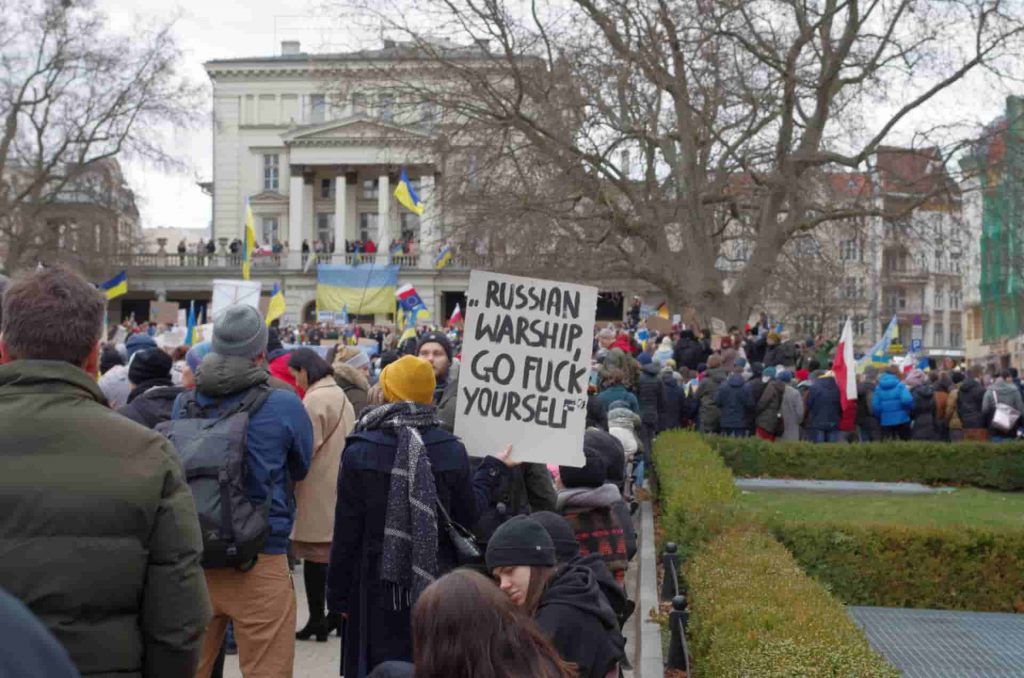
Protests in Poznań - against Russian agression in Ukraine. Photo: Bohdan Bobrowski/Flickr
In this column, UN-aligned members and readers of the Gordian Magazine express their thoughts and opinions about the latest events in Ukraine.

We support Ukraine because it represents the sacrosanct right to build one’s own future
By Alex Liberto (Literary editor of the Gordian)
After appealing to the Russian President, Volodymyr Zelenskyy only received silence in return. He therefore decided to deliver a speech to the people of Russia and to the people of the world; not as the President of Ukraine, but as he put it, as a citizen of Ukraine.
Zelenskyy spoke about the shared 2000km border with Russia that is today breached by almost 200,000 soldiers and thousands of military units. This situation could trigger a widespread war on the European continent. The area is now a smouldering keg that could potentially burst into a catastrophic conflagration.
Zelenskyy reiterated that the people of Ukraine do not need the Russian army to bring them freedom, as they were told. The Ukrainians are free and have been free, living peacefully and building their own future. They have their own culture and are proud of it. The people of Russia were told that the Ukrainians hated Russian culture, but how can culture be hated?
Zelenskyy spoke about mutual cultural enrichment that unites people. There is no, as he put it, “us and them”. Sure enough, it is diverse and unique cultures that should unite nations, not divide them.
The President then mentioned specific cities and places which he was supposedly intent on attacking without question. He categorically denied this, pointing out that places like Donbas, Donetsk, Artema, Donbass Arena or Lugansk were part of his life, imbued with memories and personal affection.
They were as special to him and his people, as they were insignificant to the Russians who have probably never heard of these places. It is this land, this heritage, this history, that belongs to the people of Ukraine.
Zelenskyy spoke directly to the Russian citizens, pointing out how many have visited Ukraine and have family there. Many have studied at Ukrainian universities, making friends and sharing common values and knowledge. Russians and Ukrainians want peace.
Ukraine is supported by many countries because it represents the right to build one’s own future, in peace within the safety of their borders, without the threats of aggression. Peace, principles, justice and self determination are sacrosanct. That is why the Ukrainians do not want war. They want to live harmoniously among their own people, sharing the culture and heritage with their neighbours and the world.
Zelenskyy, however, made it as clear as daylight that when attacked they will not sit back and accept. They will defend themselves at the risk of losing their lives and livelihoods. The President stressed that, although his main goal would always be to fight for peace in Ukraine, it was the security of all Europe that was actually at stake. Destruction and devastation would be inevitable and the ones to suffer will be the people, the common everyday people. It is this reason that should prompt ordinary people to become the bulwark of a peaceful society. People from all walks of life should rise up and show the world that peace is the only solution.
The president ended his riveting speech with a powerful interrogation:
“Do the people of Russia want war? I would like to be able to answer this. But the answer depends only on you: the citizens of the Russian Federation.”

“World peace” can only be secured through enforceable “world law”
By the Young World Federalists
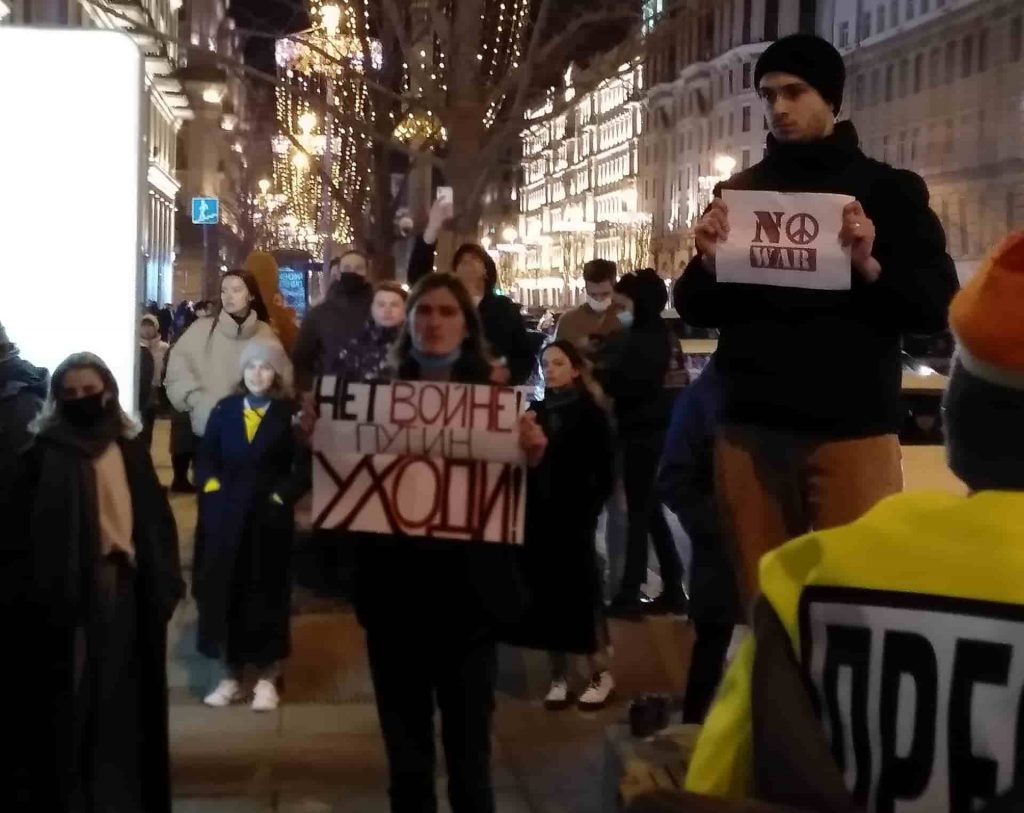
Protests against war in Ukraine in Moscow. February 24th, Moscow. Tverskaya street. CC BY-SA 4.0
Military buildup, aggression, and the recent formal recognition of the Donetsk and Luhansk People’s Republics as independent states by the Russian government have heightened international tensions. Despite the best efforts of diplomats and world leaders, Europe is facing a new international war, potentially even more intense than the ongoing conflicts on Russia’s borders. Excessive military posturing, threats of nuclear conflict, and the recent military exercise of forces of Russia’s nuclear triad (including the firing of two nuclear-capable intercontinental ballistic missiles) have further brought a large-scale nuclear war back into the realm of possibility. The ineffective international response to Russia’s annexation of Crimea in 2014 has already shown the modest limits of diplomatic measures.
The situation has reached a tipping point. Under the disguise of a peacekeeping mission, Russian troops have now entered the territory of Ukraine, in clear violation of international law.
As a member of the United Nations, Russia has agreed to “refrain in their international relations from the threat or use of force against the territorial integrity or political independence of any state” (Article 2). The Budapest Memorandum requires Russia to “respect […] Ukrainian independence and sovereignty in the existing borders” and to “refrain from the threat or the use of force against […] Ukraine”. The Minsk Protocols finally aim to “restore control of the state border to the Ukrainian government in the whole conflict zone” and specify the “pullout of all foreign armed formations, military equipment, and also mercenaries from the territory of Ukraine”.
The Russian government has ignored and openly violated these international treaties, so far without tangible consequences.
As world federalists, such an escalation which could result in all-out war deeply alarms us. Abolishing war and establishing peace is instrumental in creating a just, democratic global society, and we firmly believe that world federalists must call out and condemn any aggressor of said tensions.
We ask you to join the Young World Federalists in calling for the following immediate measures to alleviate the issue and protect the people in danger:
- Deploy UN Peacekeepers to the occupied region to ensure stability,
- Enforce stricter, targeted sanctions against Russia’s leadership for these repeated provocations,
- Grant visa-free travel to Ukrainians who may have to flee war and seek asylum abroad, and
- Ensure that humanitarian aid missions have access to the region and can reach civilians in need.
Furthermore, the crisis highlights the shortcomings of international security built on voluntary treaties. World peace can only be secured through enforceable world law, and by holding aggressors accountable for their actions.
In light of this, we reiterate our demands for the following long-term institutional reforms:
- Remove the veto of the permanent members of the UN Security Council,
- Establish a UN Parliamentary Assembly with proportional representation,
- Grant universal jurisdiction to the International Criminal Court in which individuals have standing, and add further crimes that affect all of humanity to its scope,
- Make the UN budget independent of national contributions, e.g., by levying a global tax,
- Establish a standing rapid reaction force under UN command,
- Recognize the supremacy of internationally established human rights law over national law, and
- Continue the support for democratisation movements and processes everywhere in the world.
While world federalists oppose war, we should not fall victim to the fallacy of rejecting all military assistance. Ukrainian and Russian citizens alike are victims of the aggressive rhetoric and actions of Putin and his accomplices and need our support. Our goal should rather be to protect the Ukrainian people from the bullying of a larger nuclear power, and to establish an international order in which Ukraine does not need to fear an invasion. World federalists should stand with the Ukrainian people and strive to create the conditions to abolish the institution of war, once and for all. Let us keep the credo of the United World Federalists, our American forerunners in the 1950s, in mind:
We believe that peace is not merely the absence of war but the presence of justice, of law, of order - in short, of government and the institutions of government; that world peace can be created and maintained only under world law, universal and strong enough to prevent armed conflict between nations.
We invite you to join us in our support of a democratic world federation with the means to place international affairs on the basis of enforceable, transparent world law, and hold aggressors accountable.
- The Young World Federalists (YWF) is a non-profit organisation and an associate member of the World Federalist Movement.
- Learn more about the Young World Federalists here.

An Invasion of commonsense: Dictators not only invade territories, but also our language
By Ashkan from Iran (UN-aligned member)
There is no invasion, suppression, or genocide, just some politicians generously offering us some “peace”, “protection”, and “solution”! Here are some radiant examples:
Vladimir Putin refers to the Russian invading troops as peacekeepers (миротворцы) doing the peacekeeping task of maintaining peace in Donetsk and Lugansk—two self-proclaimed and pro-Russian Ukrainian regions bordering Russia (coincidently, the Slavic name “Vladimir/Владимир” literally translates both into “ruler/governor of the world” as well as “ruler of peace”).
The Iranian Islamic government is planning to practically suppress the basic rights of Iranian internet users (obliterating their online privacy, cutting access to most global web services, banning Android and iOS phones, etc.) under some regulations referred to as Protection of User Rights in the Cyberspace (صیانت از حقوق کاربران در فضای مجازی —I hate the word so much that I don’t even want to look at it).
The Nazis used to refer to the Jewish genocide as the Final Solution to the Jewish Question (Endlösung der Judenfrage).
- For security reasons, this UN-aligned member is using an alias

Russia’s aggression is unleashed: sadly, it will be the people, including its own, who will suffer
By Dr. Usha Roopnarain (UN-aligned member)
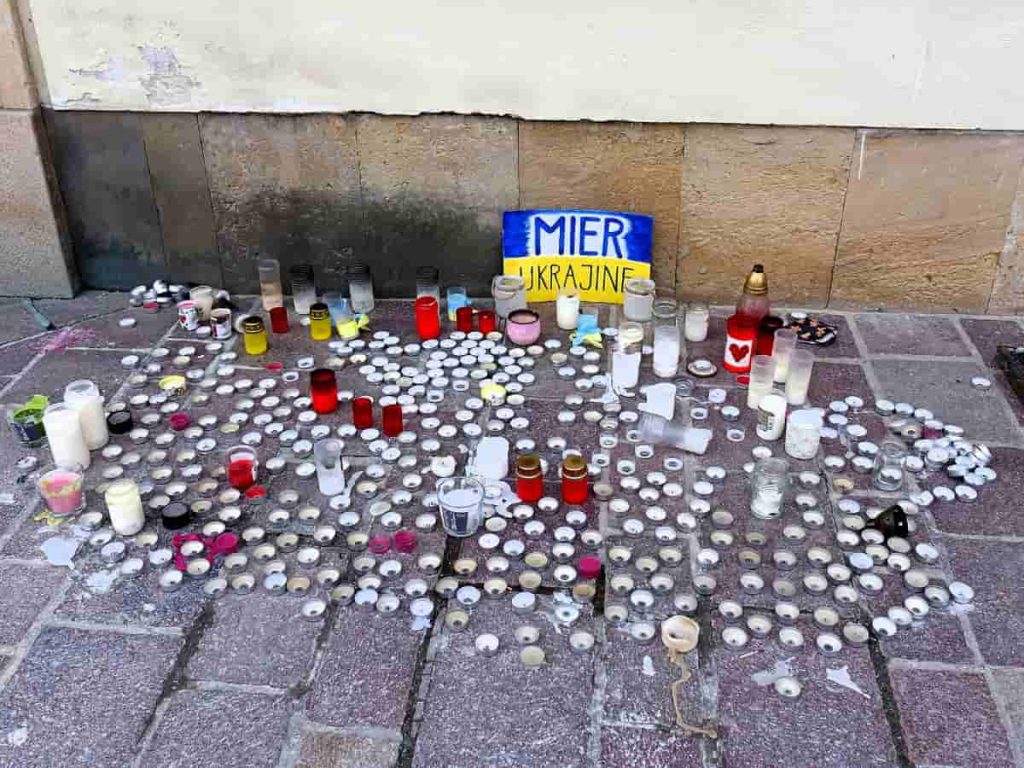
Solidarity with Ukraine at Prešov Slovakia. CC BY-SA 4.0
On Thursday 24 February 2022, Vladimir Putin authorised a “special military operation “ against Ukraine. He termed this an operation to “denazify” the Ukraine. This conflict will have a ripple effect of casualties, including a major impact on commodities, shares and Forex. The repercussions will be felt by the people. Let us be reminded that the people are still reeling from the devastating and decimating impact of covid 19.
Putin’s track record speaks for itself, his public unraveling of grievances is NO justification for the war he has unleashed. This is a complete violation and transgression of international law. Listening to his speech, it is clear that Russia is just getting started. His aggression exhibits strategic ambitions of being the “Aggressor.” Launching a war has a devastating impact on people, including civilians.
As Russia contemplates it’s next move, may God have mercy on His children. Any conflict is very sad and this military assault is having devastating consequences on the civilians. This is a full scale invasion and there are already many fatalities. This so-called “special military operation” is unjustified. Russia’s aggression is unleashed - sadly it is the people who will suffer.
- Dr. Usha Roopnarain is the former MP in the National Assembly RSA
Vlady Hell: Putin Strikes Again!
By Adrian Liberto
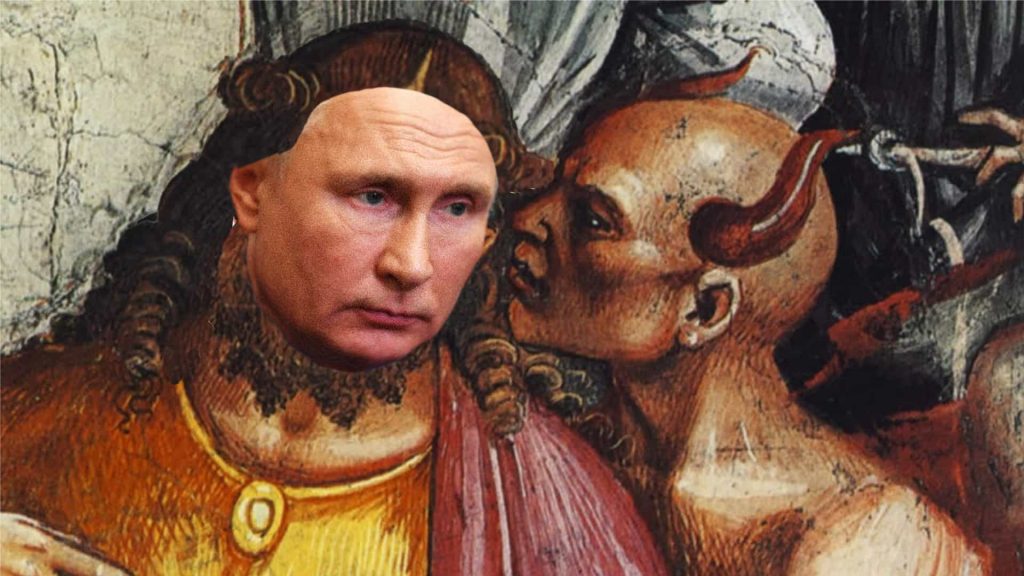
The Devil whispering in Putin’s ear. Painting: The Preaching of the Antichrist
In the August 2020 issue of The Gordian titled Russian Roulette: Why Putin’s Referendum Victory is a Threat to Humanity we published an article cheekily called Vlad the Terrible. It listed a range of crimes committed by Putin ranging from mass murder to mass deceit.
Vlad the Terrible
You play with fire and you risk getting burned; play with the devil and you end up screwed. Sadly, this is exactly what is happening to Europe and beyond now that the demon is waving his devil’s fork and even threatening nuclear destruction. The good news is not only that we have learned a lesson, but even more remarkably, that we are prepared to suffer the consequences of our mistakes and send this devil to hell!
Russian gas is, of course, the most obvious mistake, but all our transactions with this coldblooded murderer were wrong because at best, we were left with blood on our hands by association. This culture of normalising relations with tyrants for economic reasons must stop. So let this lesson stick and let us wean ourselves from this economic danse macabre with the oppressors of the world.
That article is more than ever relevant today, as Ukraine fights for its right to exist, so here are some of the examples of Putin’s crimes.
Vlad the Murderer
It should not be surprising that someone who worked as a KGB Intelligence Officer for 16 years should feel quite comfortable with committing murder. The list of Putin’s alleged victims is long and includes prominent figures such as rival Boris Nemtsov, investigative journalist Anna Politkovskaya and former spy, Alexander Litvinenko. Double-agent Sergei Skripal and his daughter Yulia were poisoned with Novichok nerve agent in England on March 4, 2018, but managed to survive the attack and are now said to be living under false identities in New Zealand. Should anyone be wondering how such a person could be tolerated in the international political community, the answer can be found in Trump’s comments, shortly after being elected, regarding Putin’s crimes: “Well, I think that our country does plenty of killing, too…”
Vlad the Oppressor
Sometimes, Putin prefers to put critics or opponents behind bars. The list of people he has imprisoned is impressive and goes into the hundreds and some are still languishing in his gulags. It includes business people, like Mikhail Khodorkovsky, artists, such as the feminist punk group Pussy Riot and filmmaker and writer Oleg Sentsov, and of course, politicians, like his main rival, Alexei Navainy and chess grandmaster, turned politician, Garry Kasparov. Indeed, incarceration is just one of many intimidation and suppressing tactics used by the president.
Vlad the Conqueror
Putin is not content with lording his tyranny over the largest country in the world. His greed is boundless, as his occupation of Abkhazia, South Ossetia and Crimea, as well as his relentless inroads into Eastern Ukraine, clearly demonstrate. These unlawful land grabs have cost thousands of lives and countless refugees… [Now, of course, he has gone for the whole of Ukraine!]
Vlad the Accomplice
At the top of the list of Putin’s unholy alliances is his support for Syria’s President Bashar al-Assad. The war in Syria, which has already cost hundreds of thousands of lives and millions of refugees, owes its continuation and much of its barbarity to Putin. Nothing is sacred for Putin. Chemical weapons have been used, schools and hospitals have been bombed and efforts to provide much needed humanitarian assistance blocked…
Vlad the Devious
A number of events that occurred within Russia’s direct sphere of influence also highlight Putin’s disregard for human life. A string of bombings in 1999, while Putin was Prime Minister, for instance, were used as a pretext to invade Chechnya, although there is evidence that suggests the bombings were orchestrated by the Russian security services. This was what Politkovskaya was investigating when she was murdered in October 2006. Equally shocking are the events surrounding the Kursk submarine disaster in which every one of the 118 crew members perished. The nuclear-powered Kursk sank on August 12, 2000, a few months after Putin became president. Not only was the Russian rescue operation suspiciously slow and botched, with an emergency not having been declared until 11 hours after the accident, but Putin deliberately forbade British and Norwegian vessels, who were better placed for a rescue mission, from assisting until a good five days had passed. It was these British and Norwegian divers who eventually found the trapped and drowned bodies seven days later. Another suspicious submarine accident, which resulted in 14 fatalities, occurred on July 2, 2019 with the deep-sea submarine nicknamed Losharik.
Vlad the self-serving
Putin’s obsession with his macho image is more than just a matter of stunts, like the famous one involving the Siberian tiger. The way the Beslan School siege was dealt with, for instance, ended up costing the lives of 333 innocent people, of which 186 were children. The siege by Islamic militants started on September 1, 2004 and lasted three days, until the lives of the hostages took second place to the need to adopt a heavy-handed approach, which resulted in the deployment of tanks, incendiary rockets and other forms of heavy weapons.
The Moscow Dubrovka Theatre hostage crisis, two years earlier had been dealt with similar disregard for human life. On that occasion about 200 of the 850 hostages died as well as all 40 Chechen insurgents when the security forces pumped a toxic gas into the theatre. The identity of the substance was never revealed.
The way the coronavirus pandemic was dealt with betrayed the same obsession with image over safety. As Kirill Martynov, the political editor of Novaya Gazeta pointed out:
“First the state lied by hiding the true extent of what was happening from the people, from itself and from the outside world. When the extent of the falsification became obvious the state continued to tell lies…”
Back to February 2022 and we can all see what turning a blind eye to this scheming despot can lead to. So far it is the full and unprovoked invasion of a sovereign democratic State, but as the Ukrainians keep telling us: “It won’t stop with Ukraine!” We need to take heed…
UN-Ukraine Timeline
By Kaitlyn Rivera (Intern at UN-aligned)
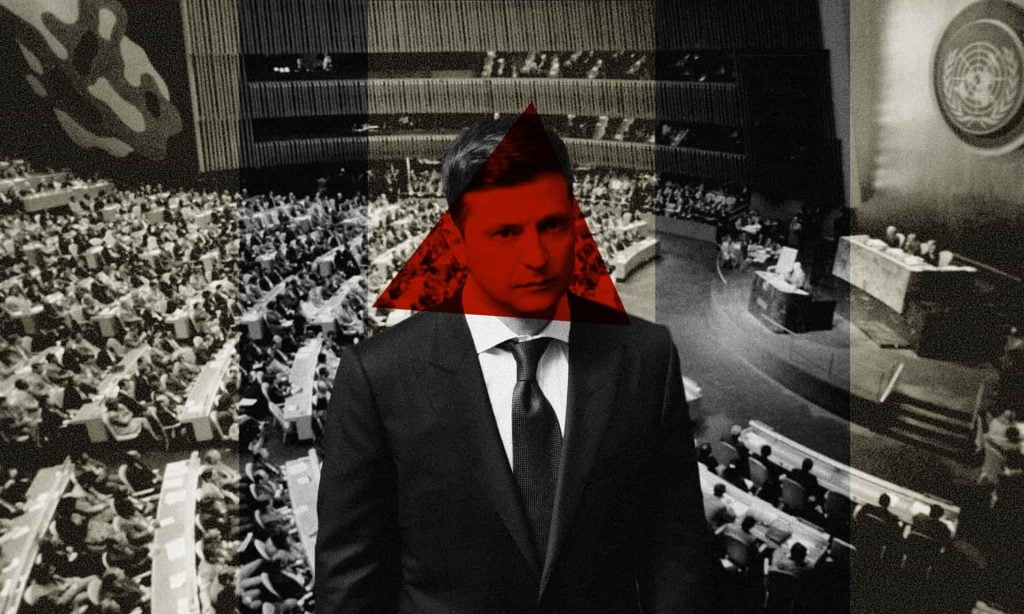
Photo by the UN-aligned design team.
January 30, 2022
Kyiv has urged Moscow to pull back its troops from Ukraine’s border and continue dialogue
January 31, 2022
US and Russia spar over the Ukraine crisis at a special closed session of the UN Security Council.
Russia’s UN envoy Vasily Nebenzya accused Washington and its allies of drumming up the threat of war despite Moscow’s repeated denials of a planned invasion. “The discussions about a threat of war is provocative in and of itself. You are almost calling for this. You want it to happen”.
February 11th 2022
President Biden warns of the “very distinct possibility” of a Russian invasion of Ukraine in the next few days
February 14th 2022
Antonio Guerres said to journalists at UN Headquarters in New York that he is deeply worried by the heightened tensions and increased speculation about a potential military conflict in Europe.
February 17th 2022
The UN political affairs chief called for meaningful progress on implementation of the 2015 Minsk agreements as she briefed the Security Council.
A letter from a permanent representative to the Russian Federation is received by the Security Council. The letter is requesting an audience with the Security Council.
February 18th 2022
Addressing world leaders at the Munich Security Conference amid an intense spike in shelling by both sides in eastern Ukraine Guterres said that it was high time to “seriously de-escalate” the crisis.
UNICEF warned that conflict in Ukraine will disrupt an entire generation of children.
February 21th 2022
Security Council Meeting on Ukraine
February 22th 2022
Following Russia’s decision to recognize the independence of unspecified areas of Ukraine’s Donetsk and Luhansk regions, the High Commissioner for Human Rights, Michele Bachelet raised concerns over the move.
Russia was strongly condemned at United Nations Security Council after Putin orders troops into eastern Ukraine
Antonio Guterres described Russia’s move as “a death blow” to the Security Council. He also highlighted that “the principles of the UN Charter are not an a la carte menu.”
February 23th 2022
Security Council Meeting on Ukraine
Sergiy Kyslytsya, the Ukrainian ambassador to the United Nations, said that article 4 of the UN charter says the UN is open only to peace-loving states that accept the terms of the charter. He said Russia’s actions showed it could not comply with those terms.
February 24th 2022
Russia launches an all-out invasion of Ukraine by land, air and sea
Speaking to journalists after the Security Council session, Antonio Guterres called the latest developments in Ukraine “the saddest moment of his tenure as the United Nations Secretary General. He called on Putin “in the name of humanity, bring your troops back to Russia”
February 25th 2022
Security Council Meeting on Ukraine to end hostilities (vetoed by Russian Federation)
In a Tweet Antonio Gueterres warned Putin that “the use of force by one country against another is wrong, against the UN Charter, and unacceptable.” He continued: “Russian military operation is wrong, is against the Charter and unacceptable”. He again appealed to Putin to stop the operation and bring the troops back to Russia.
February 26th 2022
During a UN Security Council meeting, Sergiy Kyslytsya, Ukraine’s ambassador, called for a moment of silence to pray for peace, and for the souls of those already killed after Russia invaded his country on 25 February.
February 27th 2022
The UN Security Council calls an emergency special session of the General Assembly on the Ukraine crisis.
Volodymyr Zelenskyy, the president of Ukraine, announced that it has submitted its application against Russia to the International Court of Justice. The president tweeted: “Russia must be held accountable for manipulating the notion of genocide to justify aggression. We request an urgent decision ordering Russia to cease military activity now and expect trials to start next week.”
February 28th 2022
The UN General Assembly holds an emergency meeting to discuss the attack on Ukraine by Russia. This meeting was called for by France during the Security Council meeting on the 27th and was adopted with a vote of 11 in favour. Russia had voted to block the meeting, while China, India, and the United Arab Emirates abstained. During the session, Ukraine’s ambassador to the UN read a text message exchange said to be between a Russian soldier in Ukraine and his mother shortly before he was killed.
The UN Security Council Meeting on Ukraine
The office of the United Nations High Commissioner for Refugees (UNHCR) reported at least 406 civilian casualties, including at least 102 dead.
The International Criminal Court announces that it will launch an official investigation into potential war crimes and crimes against humanity taking place in Ukraine.
March 1st 2022
The US has informed the Russian Mission to the UN that it is expelling a dozen UN diplomats from New York claiming that these Russian operatives “have abused their privileges” of US residency by engaging in espionage harmful to national security.
EU, British and US diplomats have walked out of a UN Human Rights Council meeting in Geneva during a virtual speech by Russian foreign minister Sergei Lavrov
- We are trying our best to keep the timeline updated. If you have any suggestions or if you think we have missed something, please write to us. If you are interested, see also how you can get involved.
From patriotism to pure poetry: Isaac Rosenberg’s Break of Day in the Trenches
By Alex Liberto
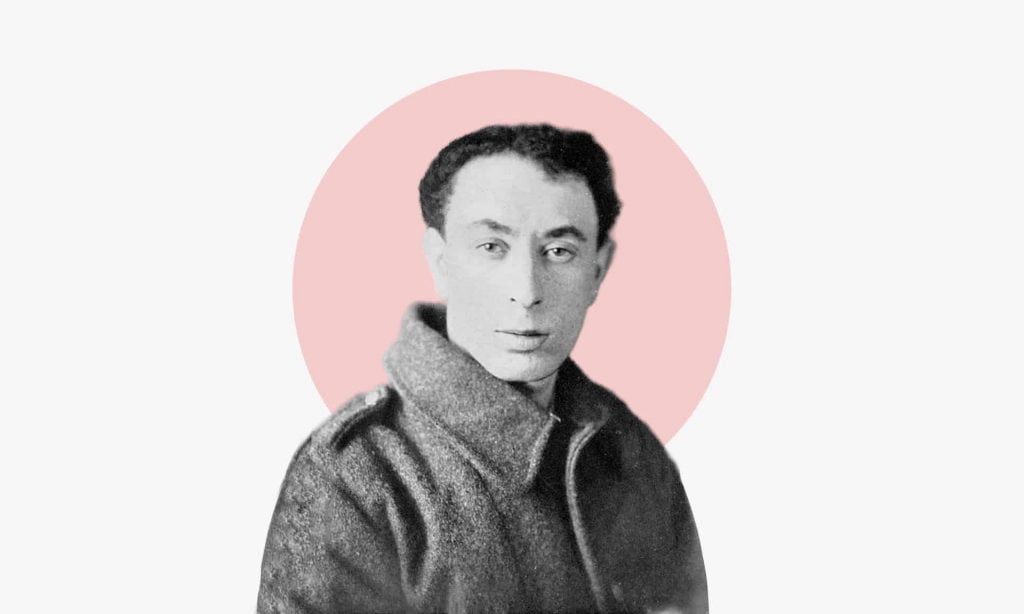
Isaac Rosenberg (1890-1918) did not sing the praises of war; he reflected on its philosophical and poetical impact through symbolism and imagery.
Break of Day in the Trenches is a short poem that not only deals with the deadly devastation of trench warfare, but also with the poetic and philosophical view of human emotions.
The opening line of the poem poetically and metaphorically describes the break of day by saying, “The darkness crumbles away”. It is not the birth of light, but the crumbling of darkness. Everything is withering, everything dies, even darkness. The poet then introduces the central figure of the poem, an ungainly rat. This lowly creature is a symbol around which the poem revolves, and is the starting point for the poet’s reflections on the atrocity and stupidity of the war.
The rat is described as being cosmopolitan. It is, in fact, a rat and therefore has no nationality, no patriotic sentiments. It crosses both sides of the trenches and scurries over German soldiers and British soldiers. It takes no sides, and in this wretched scene of death and destruction it seems to be superior to the dying soldiers.
This insignificant creature is sardonic and grins at the paradox of being more likely to live than the unfortunate soldiers, who are indeed “haughty athletes” with “strong eyes” and “fine limbs”. Although they are strong and athletic, they are in fact, shooting at each other…
Sprawled in the bowels of the earth,The torn fields of France.
The poem ends with another touching symbol, the poppy. It is a sad reflection of a life prematurely ended by war.
Poppies whose roots are in man’s veinsDrop, and are ever dropping;
The poppy is today the symbol of the fallen soldiers in that cruel First World War in which the average age of the dead soldiers was only 19. Among the hundreds of thousands killed in the trenches were 250,000 boys and young men. Isaac Rosenberg was killed there in 1918, he was only 28.
Let’s read the poem together:The darkness crumbles away
It is the same old druid Time as ever,
Only a live thing leaps my hand,
A queer sardonic rat,
As I pull the parapet's poppyTo stick behind my ear.
Droll rat, they would shoot you if they knew
Your cosmopolitan sympathies,
Now you have touched this English hand
You will do the same to a GermanSoon, no doubt, if it be your pleasure
To cross the sleeping green between.
It seems you inwardly grin as you pass
Strong eyes, fine limbs, haughty athletes,
Less chanced than you for life,Bonds to the whims of murder,
Sprawled in the bowels of the earth,
The torn fields of France.
What do you see in our eyes
At the shrieking iron and flameHurled through still heavens?
What quaver - what heart aghast?
Poppies whose roots are in men's veins
Drop, and are ever dropping;
But mine in my ear is safe,Just a little white with the dust.
“I still have hope that we will all return to our warm home and beautiful city” — Interview with Syrian refugee, Somaya
Conducted by Atika Harba
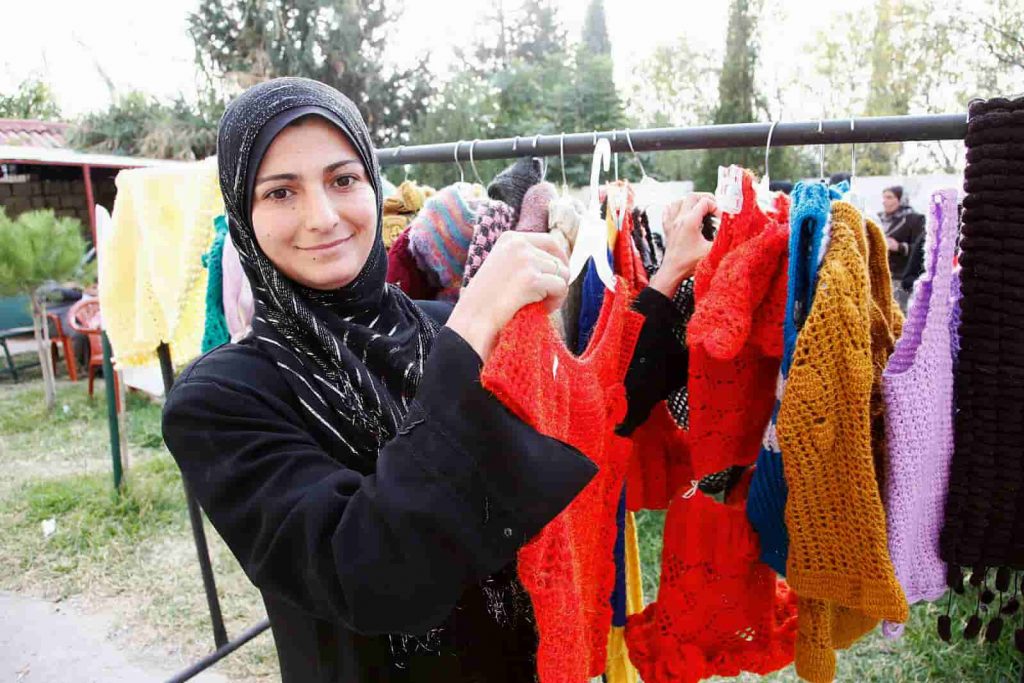
A woman from Homs, Syria, now a refugee in Lebanon, shows off knitted woolen clothes that she’s learnt how to make. Photo: DFID/Flickr
Tell me about your life and how you got here.
I am Somaya, a mother of three children, two daughters and a son. At the beginning of the war in my country, Syria, I lost my husband and did not know anything about what could have happened to him. When the battles intensified, I took my children and went to my father, as he lived alone in Damascus because my mother was dead. We lived with him for about a year, and then the war broke out in Damascus as well. One day we woke up to the sound of guns, bullets, and planes. I took my children and we went with my father to take refuge in the shelters. We stayed like this for three days until we finally decided to get away from this area. We actually made our way on foot, until we approached a car that was in a traffic jam on the way to the border with Lebanon. We accosted them and found that they too were leaving Syria for refuge in Lebanon. With them we eventually reached the Lebanese border and once in Lebanon, a tent was secured for us to live in. So after witnessing so much death, we finally found safety.
Then, together with my children, who were not yet 10 years old, and my father, an old man, and we began to look and ask for someone who could help us with blankets or mattresses or anything, as we are powerless. Indeed some people helped us as much as they could, but my father died three months later. Now my children and I live in a tent that does not protect against the heat of the sun or the cold of winter.
What do you miss in your life?
I miss the warm, affectionate place that was my home. I miss the bond that helped me raise my children while my husband was with us. I am now the father, mother and everything. When my children ask me when my father will be coming back, I tell them that we will surely be reunited with him one day. I still have hope that their father will return to us and that we will all return to our warm home and our beautiful city.
What difficult situations have you faced during these ten years at the camp?
On a cold, windy day, while the wind was uprooting everything and the rain was falling heavily, our tent covers flew off and the rain wet our mattresses and covers. We spent one of the hardest nights and no one could help me with that because the camp I was staying in was only for orphans who had lost their father. We stayed like this all night until the next day when someone came to help us.
Also, it is extremely difficult when one of my children falls ill. I have to find the right doctor in the village where we are staying, but sometimes we have to go outside the village to find a doctor who can help and prescribe the appropriate treatment for us.
What do you wish for in this life?
I hope to stay strong until my children grow up. I want to teach them to find their own way and I wish to change this situation we are in for the better.
- This interview was conducted on 28.12.21
- Diaries from Refugee Camps is a series that gives readers a glimpse inside the challenging life of refugees. Are you a refugee and would like to share your story inside this series? Please write to us.
The world stands up to Putin’s bloodthirsty antics — in pictures
By Ariana Yekrangi
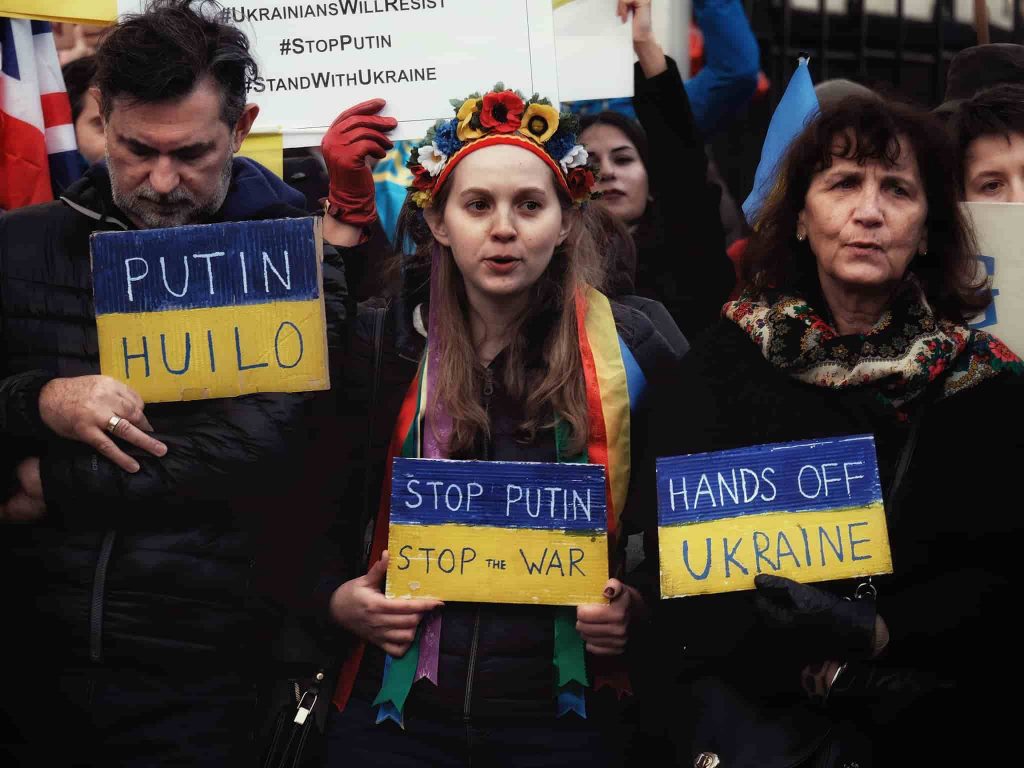
London protests against war in Ukraine. Photo: Garry Knight/Flickr
Anti war protesters have been gathering around the world to demonstrate against Russian aggression. Thousands took to the streets in major rallies across Europe while protests were reported as far away as Japan, Iran, Australia and the United States. If you would like to contribute photos that you have taken please send them our way, we would love to publish them.
Quiz: How much do you know about Ukraine?
By Katharina Wüstnienhaus
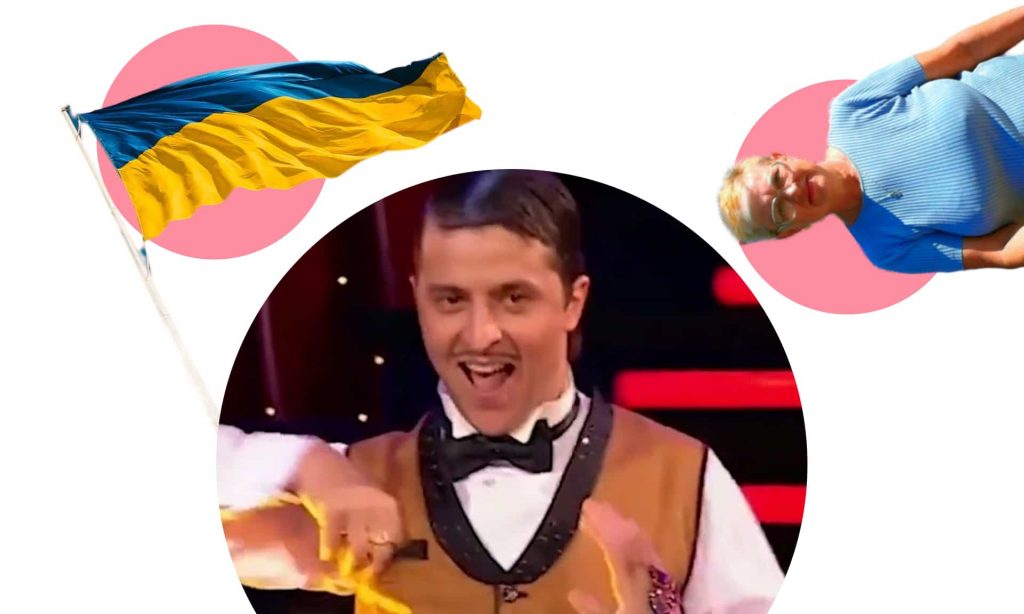
Photo by the UN-aligned design team.
In her first quiz as The Gordian’s new puzzle creator, Katharina Wüstnienhaus, created an engaging and information-rich quiz about Ukraine that you won’t want to miss.
What you may have missed in February 2022
By Adrian Liberto
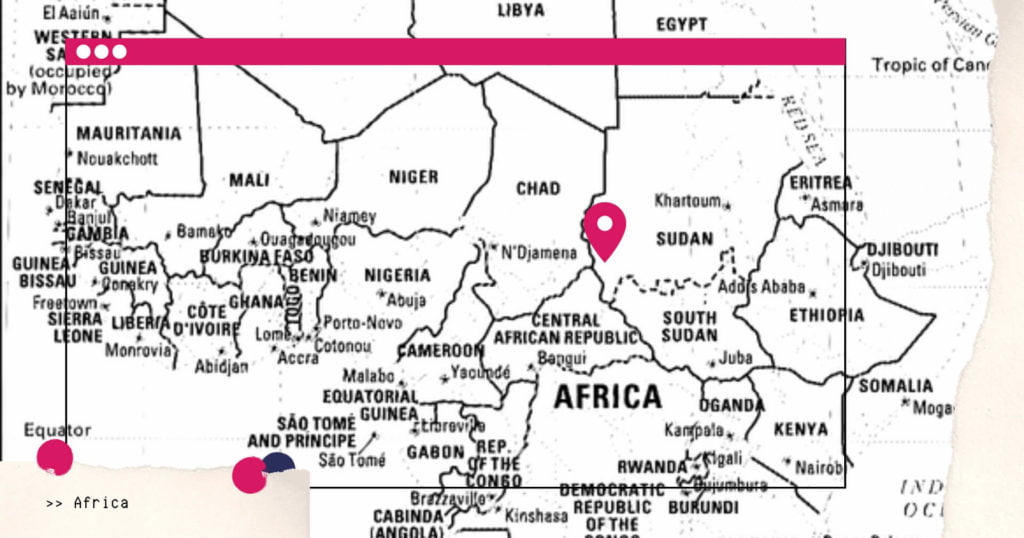
Last month’s news from the Africa
AFRICA
01.02.22: Guinea-Bissau. President Umaro Sissoco Embalo survived a coup attempt that went on for five hours. Several people died during the assault, which the president blames on elements involved in corruption and drug trafficking.
03.02.22: DR Congo. At least 60 people have been confirmed dead, including 15 children, after an attack on a camp for displaced people in the eastern province of Ituri. CODECO, a militia that was originally a peaceful agricultural cooperative, is thought to be responsible for the attack.
05.02.22. Madagascar. Cyclone Batsirai struck the island’s eastern region causing massive devastation. So far ten people have been confirmed dead and many more have been made homeless. The cyclone comes in the wake of Ana which battered southwest Africa killing 58 people around Antananarivo alone.
06.02.22. Senegal. Jubilant celebrations across the country have erupted with Senegal’s win of the Africa Cup of Nations after beating Egypt with a penalty shootout. It is the first time that the nation has won the trophy.
11.02.22: Benin. Nine people have died so far following a series of attacks in a national park in the north of the country. No one has claimed responsibility for the for the attacks so far, but jihadists who are already operating across the Benin’s northern borders in Niger and Burkina Faso are thought to be responsible.
17.02.22: Mali. Following increasing tensions with the regime after the military coup, France has confirmed that it will be withdrawing its troops and redeploying them in other parts of the Sahel region.
21.02.22: Burkina Faso. Around 60 people have died and hundreds have been injured in an explosion at a makeshift gold mine in the south-west of the country.
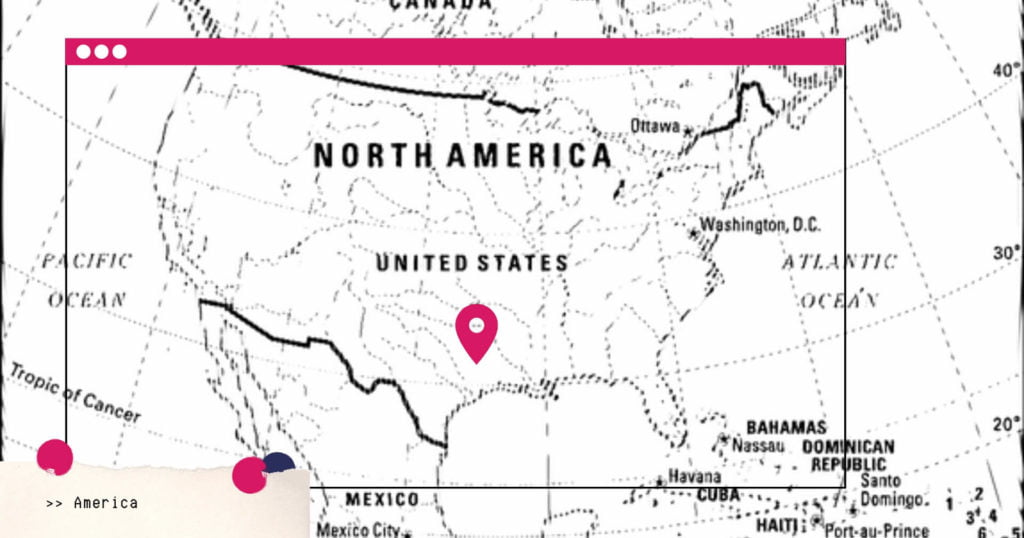
Last month’s news from the Americas
THE AMERICAS
01.02.22: USA. James Bigwood died yesterday aged 88 due to COVID related complications. Bigwood was celebrated for his atmospheric homoerotic photography, as well as his 1971 film: Pink Narcissus.
01.02.22: Brazil. Floods and landslides in Sao Paulo State over the weekend have killed about 20 people, leaving many others homeless and forcing half a million people to flee their homes.
10.02.22: USA. Universal Music Group has bought Sting’s entire catalogue, including solo works and hits with The Police. The company did not disclose details regarding payment, but the deal is estimated to be worth around $250 million.
11.02.22: Canada. Ontario has declared a state of emergency following two weeks of protests and disruption by truckers over COVID-19 restrictions.
15.02.22: USA. A Spanish fishing boat has sunk in rough seas off the coast of Newfoundland. Three crew members have been rescued, but ten bodies have been recovered and the remaining 11 people that were on board are missing.
16.02.22: Honduras. Former president and US ally, Juan Orlando Hernández, has been arrested on drug trafficking charges and is expected to be extradited to the US which was the destination of much of the illegal trade.
17.02.22: Brazil. Almost a hundred people have been confirmed dead after devastating floods and mudslides have hit Petrópolis and the surrounding mountainous areas in Rio de Janeiro State.
21.02.22: USA. Former President Donald Trump has launched his own Social Media platform called Truth Social.
21.02.22: Argentina. Rains are bringing hope that a spate of wildfires in the Corrientes province which have devastated 1.98 million acres may be coming to an end.
22.02.22: Dominican Republic. Construction has begun on a border wall in order to limit illegal immigration and drug trafficking from Haiti, which controls the western part of the island of Hispaniola. The wall will cover about half of the 393 km or so border between the two countries.
27.02.22: Mexico. About 17 people were killed while attending a wake in Michoacán. Armed men ordered them to stand in front of an outside wall before shooting them dead. Mass killings are common in Mexico and they are often related to drug wars.
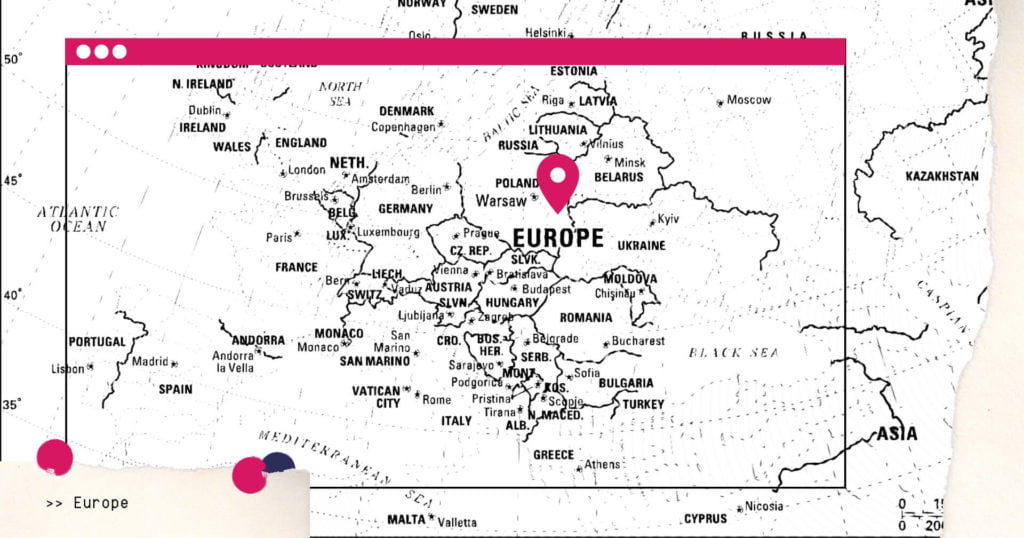
Last month’s news from Europe
EUROPE
02.02.22: Italy. Actress Monica Vitti, known as the “queen of Italian cinema” died in Rome aged 90.
02.02.22: Greece-Turkey border. At least 12 migrants froze to death. Turkish officials blamed Greek border guards of having stripped the people of their shoes and some of their clothing and forced them to head back to Turkey in freezing weather conditions. Greece denies the claims.
02.02.22: Canary Islands (Spain): About 40 refugees were rescued after their boat capsized, however, one person died and 16 are still missing.
03.02.22. Ukraine. The US has unveiled a plot by Russia to fake an attack by Ukraine so that it could have used it as a pretext to invade the country. The elaborate fabrication would have involved actors and replicas of Ukrainian and NATO weaponry. The plan was described as “very graphic” and would have included “dead bodies” and “mourners” and an indignation-rousing narrative that would have been widely and relentlessly broadcast.
03.02.22: Northern Ireland (UK). First minister Paul Givan resigned amid discontent with post-Brexit customs arrangements. Unionists say the situation is threatening the province’s place in the UK.
17.02.22: UK. The Duke of York, Prince Andrew, has reached a private settlement with Virginia Giuffre over her sexual assault claims, which will spare him the civil court case.
18.02.11: Greece. Italian-flagged Euroferry Olympia caught fire near Corfu as it was heading to the port of Brindisi. More than 270 people were rescued from the vessel, but twelve people, all thought to be lorry drivers, are missing. 20.02.22: A 21-year-old Belarusian truck driver has been found alive, but the body of a victim has also been recovered as the ferry is being towed to Corfu. The fire is now mostly under control.
20.02.22: Switzerland. A serious leak from Credit Suisse has exposed the hidden accounts of clients involved in all sorts of crimes including murder, torture, drug trafficking and money laundering. The Vatican has also been compromised by the leak because of an account used for fraudulent investments.
18.02.22: Storm Eunice has battered much of northern Europe killing at least 16 people and causing much damage to property and infrastructure.
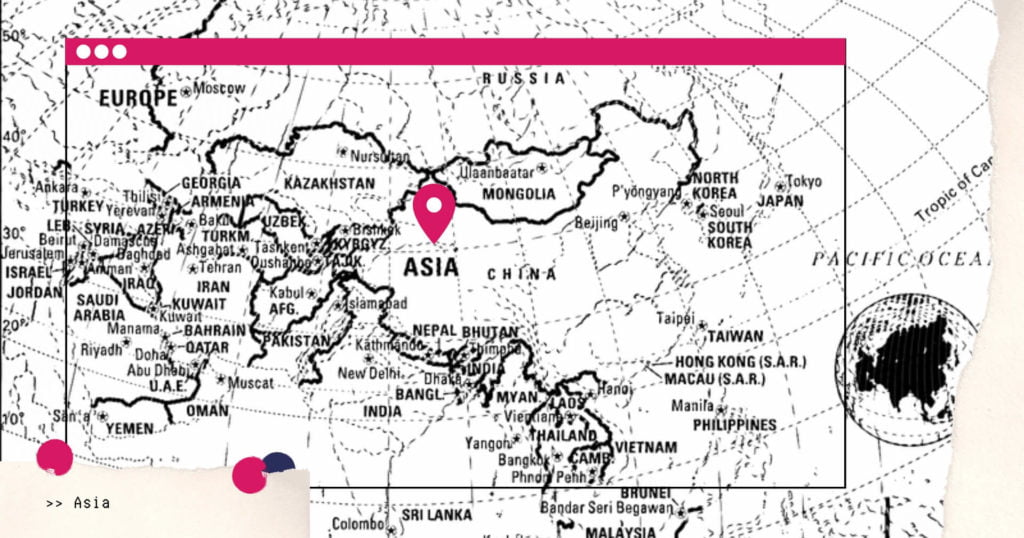
Last month’s news from Asia
ASIA
03.02.22: Syria. ISIL leader Abu Ibrahim al-Hashimi al-Qurayshi was killed in a US raid during which al-Qurayshi is said to have detonated a bomb that also killed his family. The US holds him responsible for many atrocities, including genocide.
04.02.22: China. The Winter Olympic Games officially kicked off today with a spectacular opening ceremony amid strict lockdown procedures. Many Western leaders refused to attend in protest at China’s human rights record, however, Russia’s President Putin was in Beijing exploiting the occasion to cement ties with President Xi.
18.02.22: India. 38 people found guilty of triggering a series of bomb blasts in 2008 that killed dozens of people in Ahmedabad have been sentenced to death, while 11 others were handed a life sentence.
WORLD
23.02.22: A United Nations’ Report has highlighted the threat of extraordinary landscape wildfires as a consequence of climate change.
27.02.22: The latest Report by the Intergovernmental Panel on Climate Change, an intergovernmental body of the United Nations, paints a grim picture of the state of the planet as the situation continues to deteriorate in the face of insufficient remedial action.
UKRAINIAN QUOTES:
I need ammunition, not a ride! (President Zelensky’s answer to Biden’s offer to help evacuate him from Kyiv)
Russian ship, go fuck yourself! (Ukrainian contingent based on Snake Island when asked to surrender by Russian ship. Not long after, it was thought that the 13 Ukrainian defenders had been killed by the Russian invaders, although now there is some hope that they may have actually been captured)
Can I tow you back to Russia? (Ukrainian man to Russian soldiers whose tank ran out of fuel)
Your words have less value than a hole in a New York pretzel! (Kyiv’s Permanent Representative to Security Council President)
It won’t be Mikhail Gorbachev’s name written on the death certificate of the Russian empire: it will be Putin’s. Gorbachev left Russians and Ukrainians feeling like siblings; Putin has turned them into enemies… Yuval Noah Hariri writing in The Guardian


